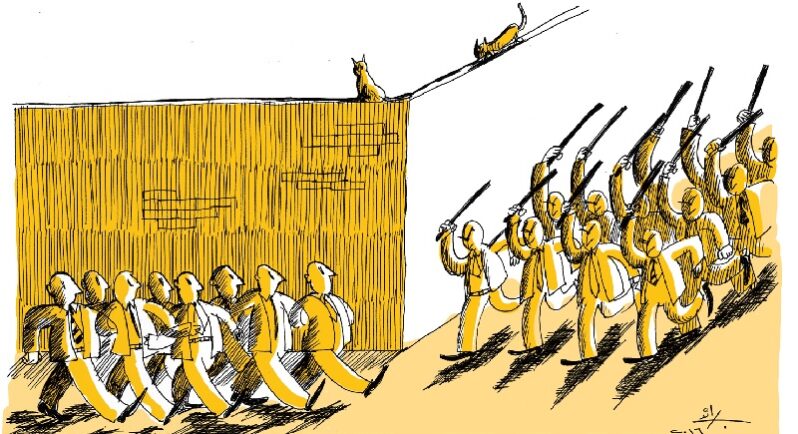Fighting Underage Marriage in Egypt: When Law Confronts Custom

The phenomenon of underage marriage is widespread in many Arab countries. Egypt has sought to confront the issue by specifying a minimum age of marriage, so that being of legal age becomes a necessary condition for registering a marriage. However, underage marriage in Egypt continues to this day in violation of the law.
Egyptian Law: Eighteen as Age of Marriage
The Egyptian Constitution of 2014 and the Egyptian Child Law both define a child as “anyone under the age of 18”. Under Article 80 of the Constitution, the State is obliged to provide children with care and protection from “all forms of violence, abuse, mistreatment, and commercial and sexual exploitation”. This includes protecting the child from underage marriage, which is considered a form of sexual exploitation. Under former article 28, Egypt’s Personal Status Law used to explicitly specify that “no marriage contract can be registered if the age of marriage is less than 18 years for the groom and 16 years for the bride”. University professor Fattouh el Chazli has pointed out that this article was in violation of the Convention on the Elimination of All Forms of Discrimination against Women (CEDAW), because the article discriminated between the sexes regarding the minimum age of marriage, in addition to the fact that it permitted the marriage of a girl when she is still a child as defined by the Child Law.[1] For this reason, the Personal Status Law was amended in 2008. Article 31 of the law now reiterates that “no marriage contract can be registered for a spouse of either sex who has not reached 18 years of age”. El Chazli has pointed out, however, that according to the way the law is formulated, it does not prohibit the marriage of those who are not yet 18 years of age – but merely forbids the registration of such a marriage. This can leave the door open to customary marriage, which violates women’s rights more than it protects them.[2]
Al-Azhar Scholars: There is No Contradiction Between Setting a Minimum Age of Marriage and Sharia
Controversy broke out in Egypt when the marriage age was first raised to 18; this controversy surfaced once more during the parliamentary sessions of 2012. Discussions took place about the need to lower or abolish a minimum age of marriage, under the pretext that this was a violation of Islamic Law. Under the latter, opponents of the law argue, a girl may marry regardless of her age as long as she has reached puberty.
However, more than one religious authority from Al-Azhar University has declared that specifying a minimum age of marriage does not contravene Sharia. Al-Azhar scholar Saad al-Din al-Hilali stated that “the Quran allows society to establish an age [of marriage] according to its customs and conditions, so as not to injure the young or deprive them of their right to childhood. It does not prevent a person who has reached the age of marriage from their right to marriage. This age varies according to time and place, and according to prevailing cultural norms”.
He added that, “by setting an age of marriage in accordance with Sharia, society raises and lowers that age in accordance with what it deems to be in the interest of society, and its protection against corruption. Everyone must comply with the minimum age of marriage in the new law, which has raised the age from 16 to 18 years”.[3] Ahmad Karima, professor of Islamic law at Al-Azhar University, emphasized the agreement between setting a minimum age of marriage and [the principles of] Sharia, and mentioned that the prevailing opinion in the Hanafi school of Islamic law is that a woman cannot contract a legitimate and [legally] sound marriage unless she is 18 years of age or older”.[4]
When the public prosecutor of South Giza was investigating the marriage of a female minor who was 14 years old, the prosecutor sought a legal opinion from Egypt’s Grand Mufti. The former Mufti, Ali Gomaa, opposed the marriage stating that “the marriage of underage individuals is considered sexual exploitation of children, and those who practice or undertake it, whether parents, lawyers, or intermediaries (brokers), should be punished”.[5] These opinions have led to the elimination of Islamic legal barriers to specifying a minimum age of marriage, and thereby enabled the use of the law to confront the phenomenon of early marriage in Egypt.[6]
Despite a Legal Minimum Age of Marriage, Underage Marriage Persists in Egypt
Studies and statements issued by the National Council for Childhood and Motherhood indicate the persistence of the phenomenon of underage marriage, despite the amendment to the law. Underage marriage is widespread in the villages and districts of the governorates of Giza and Upper Egypt.[7]
Early marriage is prevalent in two forms: the first is known as “tourist marriage”; a girl is married off to a wealthy non-Egyptian man in exchange for a sum of money, which is collected by her father. This falls under the scope of human trafficking, and is a crime punishable in accordance with Egypt’s 2010 Law 64 on Combating Trafficking in Persons. This kind of marriage is often conducted through intermediaries, and stems from a family’s poverty and its dire need for money.
According to a study issued by the National Council for Women (NCW), 300 cases of underage marriage of Egyptian girls to non-Egyptians were registered daily, a rate that increases to 500 during the summer season.[8] These marriages are carried out either through a customary contract, in which the marriage is not registered, or by falsifying the girl’s age to meet the legal requirement and register the contract.
The second form of underage marriage is according to custom and tradition. It resembles other marriages in that no sum of money is given, but occurs when a family favors the customs and traditions of the village or governorate over the limits established by law.
A study published by NCW states that 36% of rural brides are under 16 years of age.[9] This kind of marriage is based on the customs and traditions of these areas, where a girl who is still single by the age of 16 years is considered a “spinster”.[10] The low level of education in these areas influences the persistence of such customs.
These marriages can take place through a number of methods. The first is to conduct the marriage in a customary manner, and then make it official once the girl reaches the age of 18 years. A second method is to have the marriage minister draw up the contract lawfully, but refrain from registering it until both spouses are 18 years of age. Another is to have a new birth certificate issued for the girl by having a health official determine her age based on her teeth, which usually results in an estimate higher than her actual age.[11][12]
Article 227 of the Egyptian Penal Code stipulates that “whoever declares before the competent authority, with the aim of evidencing that one of the spouses has reached the age legally determined for concluding a marriage contract, statements which he knows to be incorrect, or writes or submits to the court papers to that effect, once the marriage contract is concluded on the basis of these statements or papers”, is subject to a penalty of detention for up to two years. There is also a penalty of a period of detention, or a fine for “any person vested with the authority to conclude a marriage contract, who contracts it, while knowing that one of its parties has not reached the age determined therefore in the law”. This article is considered one of the means to deal with the [various] ways that the aforementioned law has been circumvented.
However, it is clear from the statistics indicated above that legal restrictions are not enough to confront the phenomenon of underage marriage. The issue requires a number of social approaches, the most important of which include increasing the educational, cultural, social, and material status of impoverished Egyptian families.
This article is an edited translation from Arabic
__________
[1] See: Fattouh el Chazli’s, “Women’s Rights in the Field of Personal Status: The Problems of Marriage from the Viewpoint of the Law”, website of the National Council for Women, October 15, 2012.
[2] Ibid.
[3] See: “Fiqh Opinions End the Debate About the Age of Marriage”, al-Ahram, January 18, 2013.
[4] Ibid.
[5] See: “Underage Marriage: Violation of Childhood, Exploitation of Religion, Violation of the Law”, Alarabiya.net, February 11, 2010.
[6] Article 2 of the Egyptian Constitution states: “Islam is the religion of the State and Arabic is its official language. The principles of Islamic Sharia are the main source of legislation”.
[7] See: “Early Marriage: Dozens of Cases Daily and the National Council for Childhood Pursues the Perpetrators”, Aswat Masriya, October 19, 2014.
[8] See: Amal Saqar’s, “Early Marriage in Egypt”, National Council for Women, January 2013.
[9] Ibid.
[10] See: Sarah El Masry’s, “Underreported and Underage: Early Marriage in Egypt”, Daily News, May 12, 2012.
[11] Ibid.
[12] For example, teeth indicate age.



